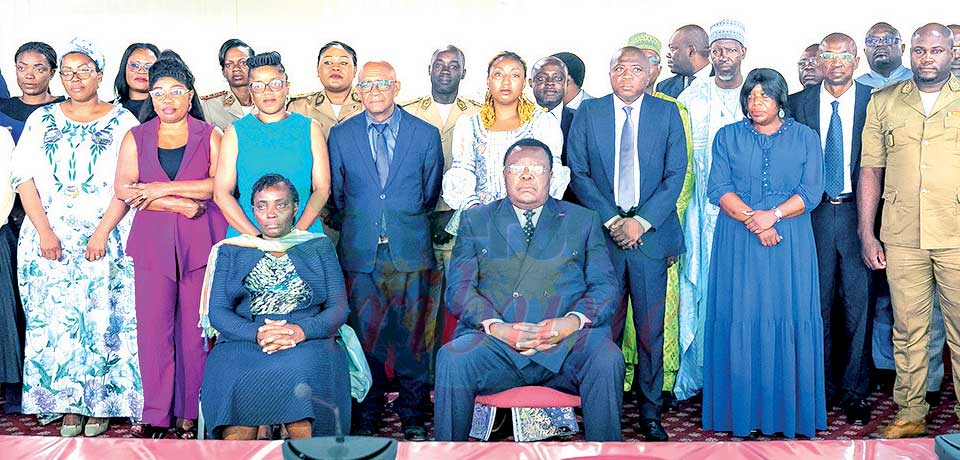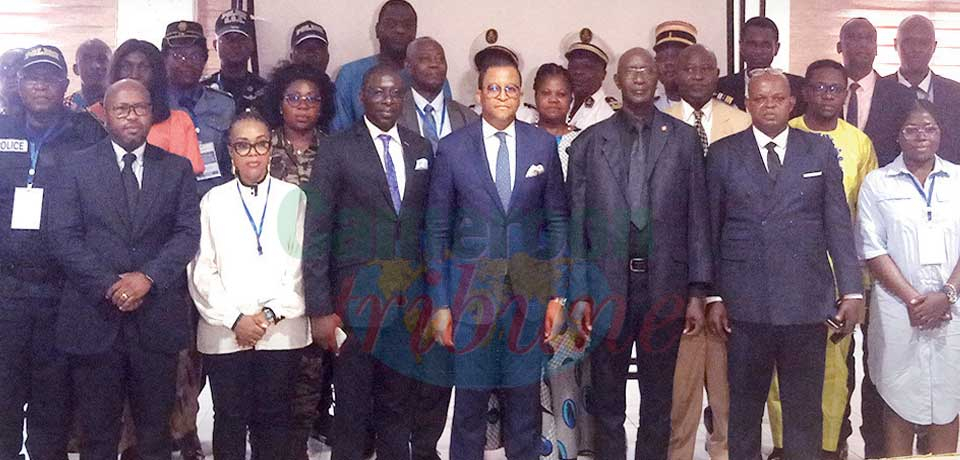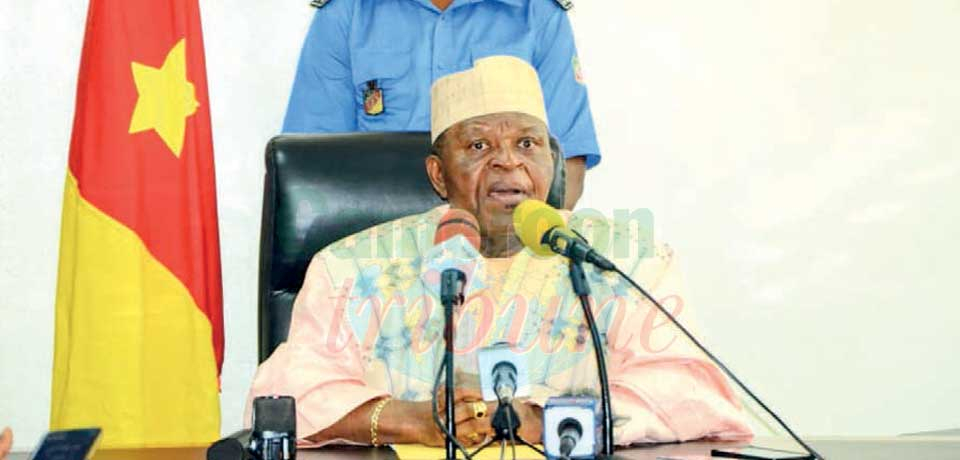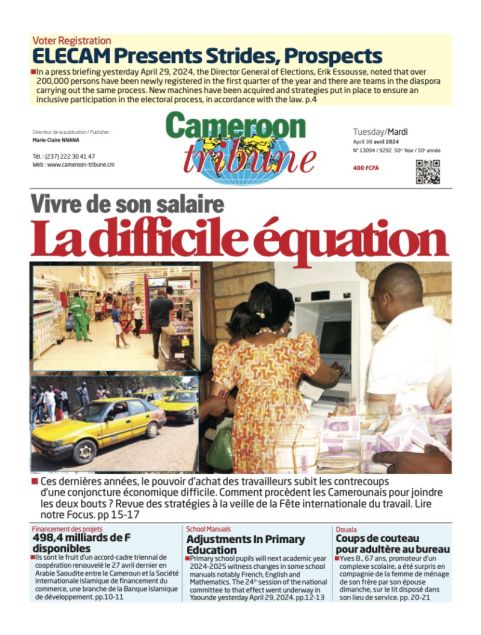English Education Subsystem: Government Actions
- Par Ayissi
- 15 févr. 2017 12:05
- 0 Likes
Deadlock has besieged the English sub-system of education since November 21, 2016 when teachers’ trade unions of the English expression grounded tools for a strike action. The government has not relented in proffering solutions to concerns raised by the teachers’ trade unions in view of getting classes resume in the North West and South West Regions. Through the Inter-Ministerial Adhoc Committee created by the Prime Minister, Head of Government, dialogue was opened between the government and the teachers’ trade unions with the State taking a series of measures to satisfy the demands made by the trade unions. The special disbursement of FCFA 2 billion by the Head of State to lay private institutions, announcement of the recruitment of 1,000 bilingual teachers as well as the redeployment of personnel in the Ministry of Secondary Education are some of the measures taken. The Ad hoc Committee headed by the Director of Cabinet at the Prime Ministers’ Office, Prof. Paul Ghogomu Mingo, had ended its work and submitted proposals to the Prime Minister. Following is Prof. Ghogomu’s declaration during a press conference on Monday in Yaounde.
“Government Has Always Shown Its Goodwill To Dialogue”
Below is a presentation of the Chairperson during a press conference of Ah Hoc Committee Chairperson and Ministers in charge of Education Yaounde, 13 February 2017
Your Excellencies, Ministers,
Ladies and Gentlemen of the press, On 6 November 2016 in Bamenda, six professional English-speaking teachers' trade unions sent a notification of a strike action to start on 21 November 2016, to parents, teachers, and students. Their notification had 11 grievances which would serve as base for their strike action.
To examine these concerns, and bring the most appropriate responses to them, the Prime Minister, Head of Government, was instructed by His Excellency Paul Biya, President of the Republic, to set up dialogue frameworks with all stakeholders of the concerns raised, to examine the pertinence of the concerns and propose solutions to decision making bodies.
In this light, in Order No. 118/CAB/PM of 8 November 2016, the Prime Minister, Head of Government, created a committee tasked with proposing solutions to the concerns of all teachers in Cameroon. The first session of this Committee held on 18 November 2016. Teachers of the English-speaking subsystem boycotted this meeting. They rather started an indefinite strike, on 21 November 2016. Government held talks with the teachers' trade union leaders, but since there was no compromise arrived at, Government met with the striking teachers once again, and this time, it is the Prime Minister, Head of Government who personally led the negotiations in Bamenda on 25 and 26 November 2016. At the end of this negotiation session, the teachers' trade unions undertook to suspend the strike if at least one of the 11 claims stated in their strike notification was met by Government latest on 30 November 2016, added to the creation of an Ad Hoc Committee specifically tasked with examining the problems of English-speaking teachers' trade unions, which should hold its working sessions in Bamenda. In compliance with its commitments and will to work towards bringing the situation back to normal, Government did not only meet one concern, but two of the concerns raised by the teachers' trade unions. These concerns are in points 5 and 9 of their strike notification.
It is against this backdrop that with regard to point 5 which raised the issue of lack of teachers in Anglophone technical schools, the Head of State ordered the special recruitment of 1000 young science and technical teachers.
Added to this favourable response, Government met another concern in point 9 which was about the weak financial capacity of lay private and confessional schools to be up to standards in the training of their students.
To remedy this situation, the Head of State ordered the setting up of a special fund of CF AF 2 billion, to serve as subsidy for lay private and confessional schools.
The Ad Hoc Committee tasked specifically with examining the problems of English-speaking teachers' trade unions, was created on 29 November 2016.
However, unexpectedly and despite the respect of these commitments in content, form, and procedures by Government, the teachers' trade unions refused to call off the strike, arguing that the concerns met by Government were not the main concerns they raised.
Despite this state of affairs, Government opened negotiations again by convening an Ad Hoc Committee meeting on 27 December 2016 in Bamenda.
During this session, the teachers' trade unions laid two conditions for the working session to start. The first was the increase in the representation of the South West Region in the composition of the Ad Hoc Committee, and the second was the unconditional release of all those arrested during the protests.
With regard to their first condition, the Committee accepted their demand and admitted all the new members designated by the teachers' trade unions.
The committee having reported that it had no jurisdiction to deal with the second condition, which is the release of persons who are being tried, the six trade unions broke off the negotiations and staged a walk-out.
Persisting in its desire to continue dialogue and to seek concerted solutions to the concerns raised by teachers' trade unions, Government went back to the negotiation table on 12 and 13 January 2017 in Bamenda.
During this session of the Ad Hoc Committee, the teachers' trade unions increased their concerns from 11 to 18, then from 18 to 21.
Each of these points was analysed in a concerted, methodical and rigorous manner.
However, while teachers' trade unions were expected to sign the press release calling off the strike as was the wish of all parents' representatives and proprietors of schools present at the negotiations, the teachers' trade unions instead requested time to think before saying anything on this issue.
When they returned to the room at the end of their consultation, unexpectedly, they made known to Government their inability to call off the strike, and posed two conditions again for the resumption of negotiations namely: the unconditional release of all persons arrested by the police and law enforcement operations in connection with the disorder and violence which ensued on public roads, and the establishment of Federation as form of the State.
After telling them on one hand, that the first prerequisite was the competence of justice and that many of those arrested were already released, and on the other hand, with regard to returning to a Federal State, that the Head of State had underscored that the form of the State was not negotiable, the Chairperson of the Ad Hoc Committee dismissed the session. In an official press release published on Monday 16 January 2017, the Chairperson of the Ad Hoc Committee, that is my humble self, recalled that Government had already implemented several recommendations from the concerns raised by the teachers' trade unions of the educational system in Cameroon, including the recruitment of 1000 bilingual teachers in Mathematics, Science, Technology and French, the on-going integration of the first wave of contract primary and secondary school teachers, the granting of an additional CF AF 2 billion to lay private and confessional primary and secondary schools as part of the State subvention for the 2016/2017 academic year, the organization of the National Forum on Education in 2017, and the redeployment of teachers of both educational subsystems according to their language competence.
He also noted that recommendations made in connection with other technical issues brought up during the negotiation sessions had been forwarded to the Prime Minister, Head of Government. Undoubtedly it should be noted that at every step of the progress of negotiations, national and international opinion was duly informed by Government.
After briefly recalling the genesis of the situation which has prevailed in the English-speaking subsystem of education in recent weeks, I would now like to dwell on the answers which the Government is giving to the various problems raised by teachers' trade unions.
Government has been very attentive to teachers' concerns. Their grievances were discussed in the various social dialogue frameworks put in place, and in a consensual way, solutions were sought and adopted. Many of them have already begun to be implemented.
Government later continued examining the concerns raised and solutions proposed. Government also drafted an action plan which has been approved the Head of State.
The actions that have already been carried out and those that will continue to be carried out are not only aimed at obtaining the calling off of any strike or any other punctual result. It is the action of a responsible Government which, conscious of the existence of real problems affecting a fundamental issue, the education of our children, strives to seek in good faith, appropriate solutions in the direction of progress. The actions undertaken and envisaged by the Government in this respect can be grouped according to the three levels of education.
1) Concerns raised at the level of basic education.
Several concerns raised by teachers' trade unions relate to human resources.
1.1. The teachers' trade unions were particularly concerned about the fate of contract teachers, and wished that they should be integrated. It should be noted that this problem does not only concern the North-West and South-West Regions.
An inter-ministerial team is already working to define the practical arrangements for integrating those contract teachers who meet the conditions of seniority following Decree No. 2000/359 of 5 December 2000 on special status of civil servants of the national education corps. Once this work is finalized, information thereto pertaining shall be sent to the people concerned, and integration operations shall start progressively depending on the availability of budget.
1.2. Still with regard to primary and nursery education, the question of the lack of teachers was raised, particularly with regard to rural areas. Specifically, Government has been notified of the acute shortage of teachers in the schools of the North-West and South-West Regions. Upon examination, it has been revealed that though this problem is real in the North-West and South-West Regions, it equally affects other Regions of Cameroon. To this effect, Government wishes to inform public opinion that a multi-year contracting plan for "parent teachers" is being implemented with the support of development partners. This is why about twenty days ago, 3050 "parent teachers" saw their ties consolidated thanks to contracting. For the current financial year, there are plans to contract 2970 holders of the Grade I Certificate, ie Certificat d'aptitude pédagogique des instituteurs de l'enseignement maternelle et primaire (CAPIEMP). This move will target areas that are most in need, as much as possible. Government shall continue, with available means, to spare no effort to ensure that all schools in the country have well trained teachers.
2) Concerns raised at the level of secondary education.
In their various claims, as well as at the consultations held in Bamenda and Yaoundé, teachers' trade unions raised several concerns on secondary education. The most salient of these concerns relate, on the one hand, to human resources and, on the other, to the difficulties encountered in technical schools of the English-speaking subsystem of education. 2.1. In terms of human resources, the question of their availability and efficiency has often come up. The recurring problem of the shortage of teachers also came up here, and it is even more serious for science and technical subjects. Government is fully aware of this. Thus, over the last decade, we have gone from one Higher Teachers' Training College to three, thanks to the creation and opening of those of Maroua and Bamenda. In the same period, the offer in the Higher Technical Teachers' Training Colleges (HTTIC) tripled. There are functional HTTICs in Douala, Kumba and Bamenda.
2.1.1 More specifically, in response to this concern, the President of the
Republic decided the special recruitment of 1000 young higher education graduates to increase the number of teachers in science and technical subjects.
2.1.2. It has also been made obvious that even when they exist, certain human resources dedicated to teaching are not always efficient because they are assigned to a subsystem that does not correspond to their pedagogic skills; at least linguistically. A census has already been carried out to identify teachers likely to be redeployed. This redeployment is effective with regard to technical education. It will be done in the coming weeks for general education and will be completed before the beginning of 2017/2018 academic year.
2.2. Technical education provided in the English-speaking subsystem of education has encountered some difficulties which have been brought to the attention of the public authorities. Suitable responses have been found and are being implemented. l will not come back to the question of the availability of teachers already discussed earlier.
2.2.1. One of the structural problems relates to the certification system at this level. It was marked by a sort of hybridization and was to a certain extent modelled on the Francophone subsystem, with diplomas such as the Certificat d'Aptitude Professionnel (CAP) or the Probatoire and the Technical Baccalauréat.
Following the working sessions of the Committee, a working group was set up to study ways and means to align the technical education certification system of the English-speaking subsystem of education with the guiding principles of the said system. This work is being completed and measures to respond to these preoccupations will start immediately to be implemented.
2.2.2. Another problem relates to the range of specialties offered in English speaking technical education. The suggestion...
Cet article complet est réservé aux abonnés
Déjà abonné ? Identifiez-vous >
Accédez en illimité à Cameroon Tribune Digital à partir de 26250 FCFA
Je M'abonne1 minute suffit pour vous abonner à Cameroon Tribune Digital !
- Votre numéro spécial cameroon-tribune en version numérique
- Des encarts
- Des appels d'offres exclusives
- D'avant-première (accès 24h avant la publication)
- Des éditions consultables sur tous supports (smartphone, tablettes, PC)














Commentaires